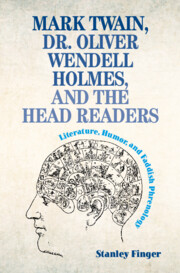 Mark Twain, Dr. Oliver Wendell Holmes, and the Head Readers
Mark Twain, Dr. Oliver Wendell Holmes, and the Head Readers Published online by Cambridge University Press: 17 April 2023
When Holmes returned to America in December 1835, he quickly completed the requirements for his Harvard medical degree and began practicing medicine. Soon after, he began teaching at Dartmouth and then Harvard. He was now using his pulpit and pen to rail against superstitions, quackery, and unsubstantiated beliefs and therapies in medicine, while making seminal contributions to his profession. He gave a lecture on phrenology in 1850, but it is not clear what he communicated. We also know that he had several phrenology books in his personal collection and used the university’s libraries, also meeting with other New England writers interested in the subject. Wanting to learn more, he had Lorenzo Fowler evaluate his head in 1859, twelve years before Mark Twain used the same phrenologist for his “little test.” What Fowler reported was preserved and is presented. Importantly, Holmes was now prepared to state what he thought about phrenology and the head readers in public.
To save this book to your Kindle, first ensure [email protected] is added to your Approved Personal Document E-mail List under your Personal Document Settings on the Manage Your Content and Devices page of your Amazon account. Then enter the ‘name’ part of your Kindle email address below. Find out more about saving to your Kindle.
Note you can select to save to either the @free.kindle.com or @kindle.com variations. ‘@free.kindle.com’ emails are free but can only be saved to your device when it is connected to wi-fi. ‘@kindle.com’ emails can be delivered even when you are not connected to wi-fi, but note that service fees apply.
Find out more about the Kindle Personal Document Service.
To save content items to your account, please confirm that you agree to abide by our usage policies. If this is the first time you use this feature, you will be asked to authorise Cambridge Core to connect with your account. Find out more about saving content to Dropbox.
To save content items to your account, please confirm that you agree to abide by our usage policies. If this is the first time you use this feature, you will be asked to authorise Cambridge Core to connect with your account. Find out more about saving content to Google Drive.